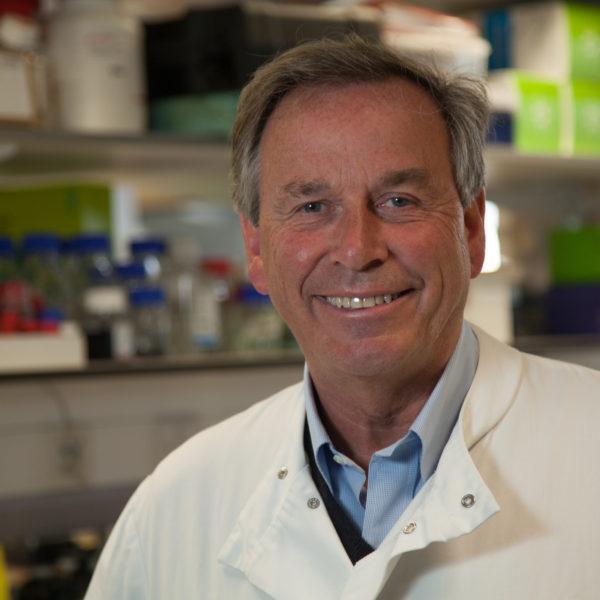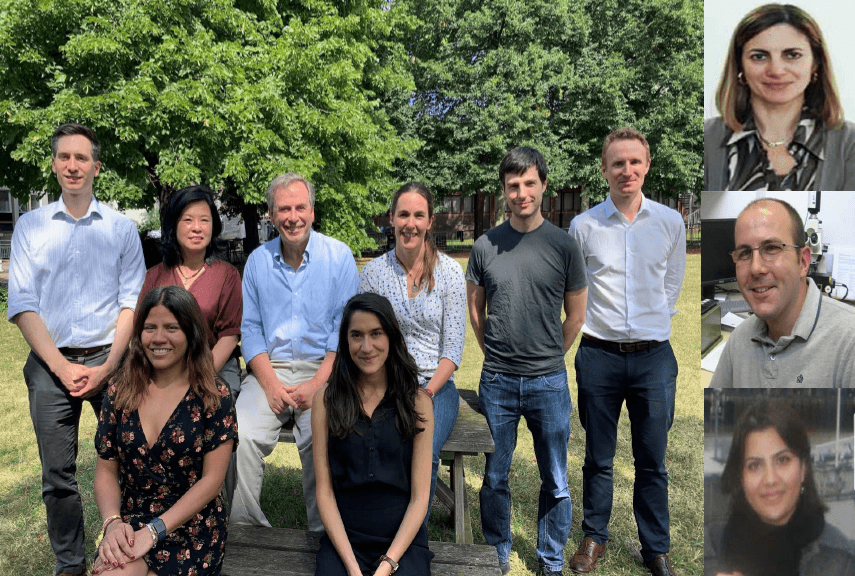
Professor John Gribben
MD DSc FRCP FRCPath FMed Sci
Professor of Medical Oncology
Wellcome Trust Clinical Research Fellow 1987-89, UCL Fogarty International Fellowship 1989-1991 Harvard
Centre Lead, Group Leader
Research Focus
My primary research interests include the immunotherapy of cancer (including stem cell transplantation), the identification of B-cell-tumour antigens; and the detection and treatment of minimal residual disease in leukaemia and lymphoma.
Key Publications
Expression of FOXP3, CD68 and CD20 at Diagnosis in the Microenvironment of Classical Hodgkin Lymphoma is Predictive of outcome. J Clin Oncol (2013) 31(2):256-62. PMID: 23045593
E(mu)-TCL1 mice represent a model for immunotherapeutic reversal of chronic lymphocytic leukemia-induced T-cell dysfunction. Proc Natl Acad Sci USA (2009) 106(15):6250-5. PMID: 19332800
Chronic lymphocytic leukemia T cells show impaired immunological synapse formation that can be reversed with an immunomodulating drug. J Clin Invest (2008) 118(7):2427-37. PMID: 18551193
SAGE analysis demonstrates increased expression of TOSO contributing to Fas-mediated resistance in CLL. Blood (2008) 112(2):394-7. PMID: 18434611
Major Funding
- 2016-2019- Wellcome Trust, Understanding the rise of HIV-assoicated Hodgkin Lymphoma despite HAART; the role of immune dysregulation
- 2016-2019- Janssen Biotech Inc, Targeting PD-LI/PD-1 mediated inbhibitory signaling with BTK inhibitors
- 2014-2019- NCI/NIH Programme Grant – CLL Research Consortium, Understanding the impact of CLL on T cell immune responses
Other Activities
- European Hematology Association (EHA), President 2019-2021
- President-elect 2017-2109
- EHA Governing Board, 2015-
- International workshop for NHL – Chair 2014-
- MRC Molecular and Cellular Medicine Board (MCMB), 2007-2012
Research
The research interest of my group focuses on immunological approaches to the treatment of haematological cancers. In particular, we are interested in understanding:
- The molecular mechanisms whereby cancer cells induce changes in the host immune system
- The use of allogeneic stem cell bone marrow transplant to induce a graft versus leukaemia effect
- Identification of the antigenic targets expressed by cancer cells
- Use of agents that will make tumour cells more susceptible to immune cell mediated killing, without impacting on the host immune system
Other Activities
- European Hematology Association (EHA), President 2019-2021
- President-elect 2017-2019
- EHA Governing Board, 2015-
- International workshop for NHL – Chair 2014-
- MRC Molecular and Cellular Medicine Board (MCMB), 2007-2012
Major Funding
- 2017-2022- The London Clinic, Provision of clinical research Fellows in Haematology
- 2016-2019- Janssen Biotech Inc, Targeting PD-LI/PD-1 mediated inbhibitory signaling with BTK inhibitors
- 2016-2019- Wellcome Trust, Understanding the rise of HIV-assoicated Hodgkin Lymphoma despite HAART; the role of immune dysregulation
- 2015-2018- Barts Charity, Understanding the microenvironment in HIV associated Hodgkin Lymphoma, £283,221
- 2014-2019- NCI/NIH Programme Grant – CLL Research Consortium, Understanding the impact of CLL on T cell immune responses, $1,200,000
Recent Publications
Integrative phosphoproteomics defines two biologically distinct groups of KMT2A rearranged acute myeloid leukaemia with different drug response phenotypes Casado P, Rio-Machin A, Miettinen JJ et al. Signal Transduction and Targeted Therapy (2023) 8(7)
Immune effector cell–associated hematotoxicity: EHA/EBMT consensus grading and best practice recommendations Rejeski K, Subklewe M, Aljurf M et al. Blood (2023) 142(7) 865-877
P1253: REDUCED EXPRESSION OF THE CHEMOKINES CXCL2, CXCL3 AND CXCL8 PROVIDES A POTENTIAL MECHANISM PROMOTING IMMUNE EVASION FACILITATING AML RELAPSE FOLLOWING ALLOGENEIC HSCT Charrot S, Ball J, Copley F et al. HemaSphere 7(10) e0435780
P1254: BASELINE HLA-DR-RESTRICTED NEOANTIGEN BURDEN OF AML BLASTS IMPACTS ON HLA-DR GENE EXPRESSION AT RELAPSE AFTER ALLOGENEIC STEM CELL TRANSPLANT Charrot S, Ball J, Copley F et al. HemaSphere 7(10) e3541969
S124: PHOSPHOPROTEOMICS ACCURATELY PREDICTS RESPONSES TO MIDOSTAURIN PLUS CHEMOTHERAPY IN TWO INDEPENDENT COHORTS OF FLT3 MUTANT-POSITIVE ACUTE MYELOID LEUKAEMIA Dokal A, Borek WE, Nobre L et al. HemaSphere 7(10) e3920765
S260: IMMUNE EFFECTOR CELL ASSOCIATED HEMATOTOXICITY (ICAHT) FOLLOWING CAR T-CELL THERAPY: INTERNATIONAL SURVEY AND CONSENSUS GUIDELINES ON ITS GRADING, DIAGNOSIS, AND MANAGEMENT ON BEHALF OF EHA AND EBMT Rejeski K, Greco R, Onida F et al. HemaSphere 7(10) e63003a8
Obinutuzumab Versus Rituximab Immunochemotherapy in Previously Untreated iNHL: Final Results From the GALLIUM Study Townsend W, Hiddemann W, Buske C et al. HemaSphere (2023) 7(7) E919
Targeting the methylome to improve CLL outcome Gribben JG Blood (2023) 142(7) 4-6
Need for risk adjustment in comparative effectiveness and cost-effectiveness studies in r/r follicular lymphoma Gribben J, Palomba ML, Patel AR et al. Blood Advances (2023) 7(7) 2494-2495
The prognostic value of progressing within 24 months of frontline chemoimmunotherapy (POD24) in relapsed/refractory (R/R) follicular lymphoma (FL)—a SCHOLAR‐5 analysis Patel AR, Limbrick‐Oldfield EH, Kanters S et al. Hematological Oncology (2023) 41(10) 376-377
For additional publications, please click hereTeam
 Group Leaders in the Centre
Group Leaders in the Centre
Dr Andrejs Braun, Dr Jeff Davies, Dr Gabriella Ficz, Professor Kamil R. Kranc, Dr Sergey Krysov, Dr Rifca Le Dieu, Dr Kevin Rouault-Pierre, Dr John Riches, Dr Bela Wrench
Clinical Research Fellows
Dr Jennifer Edelmann, Dr Robin Sanderson, Dr Joseph Taylor, Dr Edward Truelove
Biography
I hold the Gordon Hamilton Fairley Chair of Medical Oncology at St. Bartholomew's Hospital, Barts Cancer Institute, Queen Mary, University of London. My doctoral studies were performed at University College London as the recipient of a Wellcome Trust Fellowship Award. I continued post-doctoral training with Professor Lee Nadler at the Dana-Farber Cancer Institute, Harvard Medical School.
In 1992, I was appointed to the Faculty at Harvard Medical School, where I remained as Associate Professor of Medicine and an Attending Physician at the Dana-Farber Cancer Institute and Brigham and Women's Hospital, until returning to London in 2005. I am a founding member of the CLL Research Consortium, Associate Editor of Blood and was elected a Fellow of the Academy of Medical Science.
